Premium Only Content
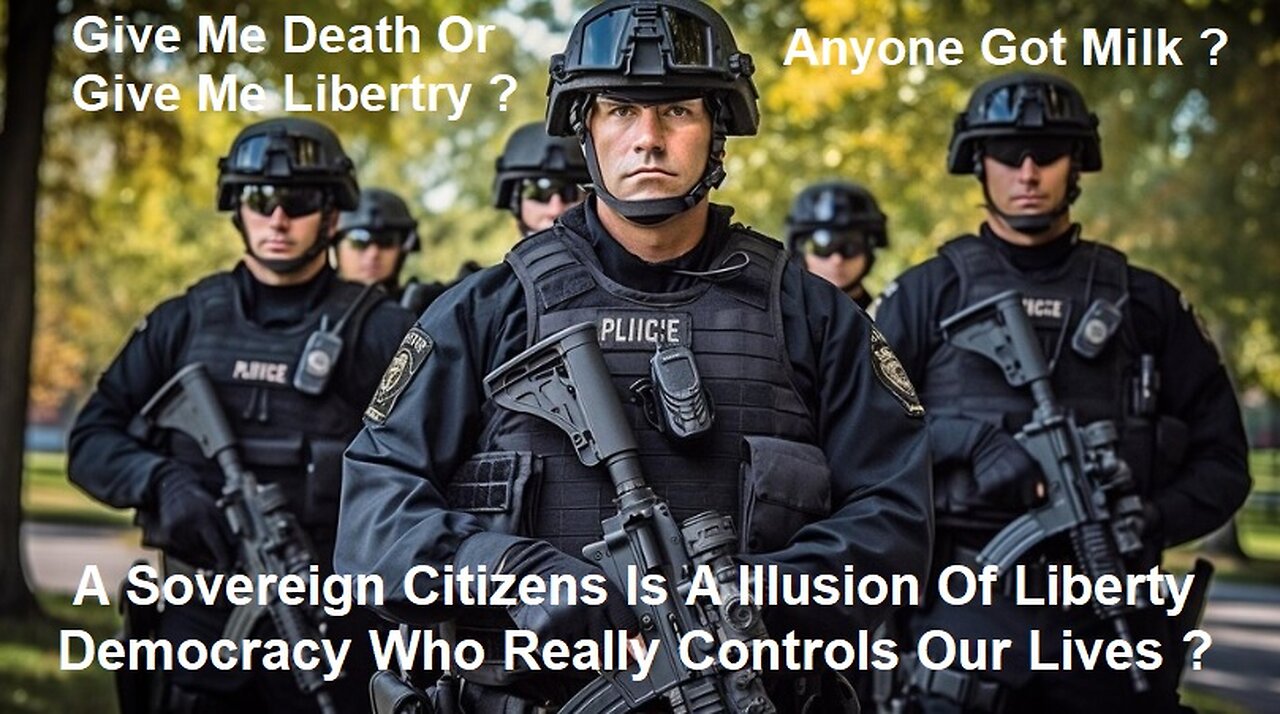
Sovereign Citizens Is A Illusion Of Democracy Who Really Controls Our Liberty-Lives
Is Life about Illusion of choice or do you really have a choice in life. What we eat, what we read, who we elect; every day we make choices that determine how we want to live. Life, Liberty and the Pursuit of Happiness Is A Citizens Illusion Of Democracy. But what if these choices are just an illusion? In an era where regulations and red tape rule every industry, where lobby groups and big business wield more influence than ever before, our daily choices have become increasingly limited. Focusing on key areas such as food, medicine, finance, and media, Freedom From Choice provides viewers with a glimpse at the myriad of ways their lives are being dictated, and tells us who stands to gain. Follow The Money and Read All The Text Below... Thanks ! ! !
Sovereign citizens believe they are not under the jurisdiction of the federal government and consider themselves exempt from U.S. law. They use a variety of conspiracy theories and falsehoods to justify their beliefs and their activities, some of which are illegal and violent.
You can now go to prison in Canada for providing raw milk. Seriously Justice P. W. Sutherland of Ontario’s Superior Court of Justice imposed an injunction in a case called Downing v. ARC. Downing is the provincial Milk Act Director, while ARC is an incorporated farm co-op that allegedly was distributing raw milk, but has now closed down its milk operation. In essence, the decision transformed an action that was previously a provincial regulatory offence punishable only by fines — distributing raw milk — into a federal crime punishable by up to two years in prison.
A Wisconsin dairy farmer is set to go on trial for a strange offense: selling raw milk to a group of consumers who were members of a private buyer’s club. Sarah Begley reports on the clash between regulators and foodies.
So in many parts of America, it’s basically legal to grow, sell, and smoke pot. But you can go to jail for selling people fresh milk? Wisconsin dairy farmer Vernon Hershberger, a 41-year-old father of ten, will go on trial later this month for three counts of licensure violation and one count of violating a hold order. The maximum combined penalty: $13,000 and/or two and a half years’ jail time. All for 300 gallons of raw milk.
Hershberger started a private buyer’s club for raw milk in 2003 after “some friends from town—who were retired farmers—wanted to continue getting this raw milk that they had for years. By word of mouth,” he told The Daily Beast, “it grew from there.” By the time of his arrest in 2010, over 100 families were members.
Technically, these club members were not customers of the farm, but partners: they legally leased animals from Hershberger, and in return for his family boarding and caring for their cattle on his 157 acres of farmland, they paid certain agreed-upon fees each time they came to pick up the products of those cattle—namely, raw milk. So Hershberger felt he didn’t need a license as a retail food establishment, because there was no retail going on; the milk already belonged to the club members.
In June, the Wisconsin Department of Agriculture, Trade and Consumer Protection paid a visit to Hershberger’s farm in Loganville, about 50 miles northwest of Madison, and found Hershberger’s raw milk in tanks. Deeming it to be “adulterated and misbranded,” they dyed the milk blue. Retail sale of raw milk is only legal in 10 states, and Wisconsin is not one of them. So the state put a hold order on the milk, essentially condemning it to spoil.
Hershberger grew up milking cows by hand on a small Amish dairy farm, and this hold order violated his religious values: though no longer Amish, he’s a non-denominational Christian, and opposes waste. “We can plainly read in the Bible that we are to be good stewards of what God has provided for us,” he says (though the court has ruled he cannot introduce any evidence relating to his religion). He broke the hold order and allowed the members of the buyers club to collect what he felt was theirs.
4 Questions Raised by the Amish Raw Milk Trial Here are four questions raised by the trial:
1. Is buying raw milk (or any unsanctioned food) an American right?
Americans have always been able to obtain food privately – whether directly from farm stores or at church suppers or via lemonade stands or from neighbors selling extra milk or cans of food. It’s just that the “right” wasn’t called a right, because it was a custom or a tradition, a part of the fabric of life in communities large and small. The tradition has continued via farmers markets and CSAs. Private markets sprung up even for prepared food – for example, San Francisco’s Underground Market, with vendors selling food ranging from foraged seaweed to Belgian waffles. Elected and appointed officials didn’t even think to question it because they were getting food that way as well. But in recent years, government at all levels has begun challenging the custom more aggressively; for example, San Francisco public health officials shut down the Underground Market in 2011, after it was deemed to have gotten out of hand because it had grown so large. Still, a growing number of people have been seeking food directly from farms, This makes the long-ignored custom feel more like a necessary right.
2. Who counts as the “public,” anyways?
Do I need a permit to serve raw milk pudding in my own home to friends?
So while Hershberger says he is making food available to members of a discrete private group of individuals, who have leased his animals and have ownership of their production, the state says there is no such distinction between the mass of shopping consumers and members of a private food group. In one pretrial dispute over instructions to a potential Hershberger jury, prosecutors took dead aim at a defense proposal to distinguish Hershberger’s food club members from “the public.” The state noted that “defendant requests that the jury be instructed that ‘owners or operators’ of a farm are not members of ‘the public.’…There is simply no such exception in the licensure requirements of (the Wisconsin statute) or in the definition of retail food establishment…” In a footnote, the state added, ” ‘General Public’ means persons who are served a meal, but are not part of the household.”
3. What are the actual current laws about what farmers can sell?
Part of the legal challenge is that there isn’t a lot of legal precedent covering private food sales by farmers. Farmers just did it, and no one questioned it – it was how many people obtained their food before the advent of supermarkets. But the growing concerns many people have about pesticides, hormones, and antibiotic residues in their foods have driven more consumers to seek out food raised the old-fashioned way from farmers like Vernon Hershberger. Regulators, more sensitive than ever to problems from food tainted by pathogens, have raised objections to the private unregulated sales.
Lately, though, judges have been mostly buying into the regulator-prosecutor argument that there is no right to privately obtain forbidden foods. Take, for instance, Wisconsin Judge Patrick Fiedler’s now-infamous 2011 statement that farmers have “no… fundamental right to consume the milk from their own cow.” Now another Wisconsin judge, Guy Reynolds, is hearing the arguments in the Hershberger case, and being forced to think about hard issues here. But unlike those other cases, Judge Reynolds must defer to a jury, which will render the final verdict.
4. Will this trial set blueprint for what farmers can sell privately?
This is one of a cluster of similar cases around the country occurring at both the federal and local level. There was a loss when an Amish farmer in Pennsylvania last year decided to quit farming rather than fight a federal injunction prohibiting him from shipping raw milk to food club members in Maryland. But last September, a jury acquitted a Minnesota farmer, Alvin Schlangen, who was accused of similar violations as Hershberger. In quickly deciding in favor of the farmer, the jurors rejected the government arguments nearly as definitively as Judge Fiedler rejected the farmers’ arguments. But then in late April, a Maine judge ruled against farmer Dan Brown, essentially nullifying a “food sovereignty” ordinance his town, Blue Hill, had passed two years earlier, allowing farmers to sell food directly to consumers without regulatory interference.
With the legal landscape uneven thus far, the Hershberger case clearly takes on added importance. The Wisconsin prosecutors are understandably terrified to be going before a jury of ordinary people, who understandably will wonder why the state is expending so much effort against a single farmer committing the crime of making healthy food available to a small community of eager eaters. While the trial next week will focus heavily on legal technicalities associated with permits and licenses, it is important for farmers to not lose sight of the forest for all the crazy and difficult-to-comprehend stuff happening in the trees.
Life, Liberty and the Pursuit of Happiness Is A Citizens Illusion Of Democracy.
https://en.wikipedia.org/wiki/Life,_Liberty_and_the_pursuit_of_Happiness
"Life, Liberty and the pursuit of Happiness" is a well-known phrase from the United States Declaration of Independence. The phrase gives three examples of the unalienable rights which the Declaration says have been given to all humans by their Creator, and which governments are created to protect. Like the other principles in the Declaration of Independence, this phrase is not legally binding, but has been widely referenced and seen as an inspiration for the basis of government. (p.s. you have no rights at all.)
Selective Service Acts and Can you really go to jail-prison for refusing to register for selective service? These days it is rarely prosecuted, unless you are brazen about it and/or cause the Selective Service some discomfort (for example, posting your refusal to register campaign on social media and it goes viral). A friend was a self-described “conscientious objector” and refused to fill out his selective service registration. He did not have any difficulties until around his twenty-first birthday. He began getting a stream of “hate mail” as he described it, from the Federal Government, warning of “arrest” and “prosecution”. I was a little concerned and did my best to look into his situation. I had helped him file some FOIA requests along with some other records searches. A response to my friend’s Freedom Of Information request came back from two agencies: One that does policing for Federal buildings (FPS) and the FBI. It had turned out my friend was photographed & identified during an environmental protest outside of a Federal building. I suspected this initiated a cursory investigation into his identity by the Federal Protective Service & the FBI, and that somehow came to the attention of the Selective Service System, which began the “hate mail”. My friend did attempt to register with the Selective Service at age 26 when he had learned that he would be denied Student Loans & Grants if he was not registered. He tried to register, but after age 25, you are not eligible. Therefore, he did not get the Grant or any other Federal Student Loans; so maybe not prosecution, but there are significant consequences to not registering. The Selective Service employs over 100 people full time, they are charged with oversight of around 35-million young men every year (yes, ONLY MEN, overt gender bias by the Federal Government that I have never once heard or seen discussed). Last year over one million young men failed to register I can understand why that agency does not have time/resources to go after the many transgressors of the Selective Service Act. I would advise any young man who has received multiple warning letters to be very thoughtful about complying, because there are essentially NO EXEMPTIONS for ANY MALE from 18-25 years-of-age living in the US. This includes Disabled, Transgendered, Convicted Felon, Illegal Resident, and Asylum Seeker—all men must register; because if you do not, you will always have those legal repercussions hanging right over your head.
Failing to register or comply with the Military Selective Service Act is a felony punishable by a fine of up to $250,000 or a prison term of up to five years, or a combination of both. Also, a person who knowingly counsels, aids, or abets another to fail to comply with the Act is subject to the same penalties.
https://en.wikipedia.org/wiki/Conscription_in_the_United_States
If a man fails to register, or provides Selective Service with evidence that he is exempt from the registration requirement, after receiving Selective Service reminder and/or compliance mailings, his name is referred to the Department of Justice for possible investigation and prosecution for his failure to register as required by the Act. For clarification, if a man is exempt from registering with the Selective Service System, his name is not forwarded to the Department of Justice. The federal law stipulates that names are to be submitted to the Department of Justice annually.
https://www.sss.gov/wp-content/uploads/2020/03/MSSA-2003.pdf
Your Right Is Go To War ? or Die In Jail ? On April 28, 1967, Muhammad Ali refused to be inducted into the U.S. Army due to religious reasons. He was stripped of his heavyweight title, suspended from boxing, and sentenced to five years in prison and a $10,000 fine. The Supreme Court eventually ruled 8-0 in Ali's favor in June 1971, mostly because the Draft Board had failed to cite a reason for denying the boxer's conscientious status. Although he never served a prison sentence, he was unable to ply his trade for more than three years while his case worked its way through the courts.
50 U.S. Code § 3811 - Offenses and penalties https://www.law.cornell.edu/uscode/text/50/3811
Life, Liberty and the Pursuit of Happiness Is A Citizens Illusion Of Democracy and No Rights.
Any member of the Selective Service System or any other person charged as herein provided with the duty of carrying out any of the provisions of this chapter, or the rules or regulations made or directions given thereunder, who shall knowingly fail or neglect to perform such duty, and any person charged with such duty, or having and exercising any authority under said chapter, rules, regulations, or directions who shall knowingly make, or be a party to the making, of any false, improper, or incorrect registration, classification, physical or mental examination, deferment, induction, enrollment, or muster, and any person who shall knowingly make, or be a party to the making, of any false statement or certificate regarding or bearing upon a classification or in support of any request for a particular classification, for service under the provisions of this chapter, or rules, regulations, or directions made pursuant thereto, or who otherwise evades or refuses registration or service in the armed forces or any of the requirements of this chapter, or who knowingly counsels, aids, or abets another to refuse or evade registration or service in the armed forces or any of the requirements of this chapter, or of said rules, regulations, or directions, or who in any manner shall knowingly fail or neglect or refuse to perform any duty required of him under or in the execution of this chapter, or rules, regulations, or directions made pursuant to this chapter, or any person or persons who shall knowingly hinder or interfere or attempt to do so in any way, by force or violence or otherwise, with the administration of this chapter or the rules or regulations made pursuant thereto, or who conspires to commit any one or more of such offenses, shall, upon conviction in any district court of the United States of competent jurisdiction, be punished by imprisonment for not more than five years or a fine of not more than $10,000, or by both such fine and imprisonment, or if subject to military or naval law may be tried by court martial, and, on conviction, shall suffer such punishment as a court martial may direct. No person shall be tried by court martial in any case arising under this chapter unless such person has been actually inducted for the training and service prescribed under this chapter or unless he is subject to trial by court martial under laws in force prior to June 24, 1948.
Sovereign Citizens - A Growing Domestic Threat to Law Enforcement. They could be dismissed as a nuisance, a loose network of individuals living in the United States who call themselves “sovereign citizens” and believe that federal, state, and local governments operate illegally. Some of their actions, although quirky, are not crimes. The offenses they do commit seem minor, including regularly false license plates, driver’s licenses, and even currency.
However, a closer look at sovereign citizens’ more severe crimes, from financial scams to impersonating or threatening law enforcement officials, gives reason for concern. If someone challenges (e.g., a standard traffic stop for false license plates) their ideology, the behavior of these sovereign-citizen extremists quickly can escalate to violence. Since 2000, lone-offender sovereign-citizen extremists have killed six law enforcement officers. In 2010, two Arkansas police officers stopped sovereign-citizen extremists Jerry Kane and his 16-year-old son Joseph during a routine traffic stop on Interstate 40. Joseph Kane jumped out of the vehicle and opened fire with an AK-47 assault rifle, killing both officers.
The sovereign-citizen threat likely will grow as the nationwide movement is fueled by the Internet, the economic downturn, and seminars held across the country that spread their ideology and show people how they can tap into funds and eliminate debt through fraudulent methods. As sovereign citizens’ numbers grow, so do the chances of contact with law enforcement and, thus, the risks that incidents will end in violence. Law enforcement and judicial officials must understand the sovereign-citizen movement, be able to identify indicators, and know how to protect themselves from the group’s threatening tactics.
Ideology and Motivation
The FBI considers sovereign-citizen extremists as comprising a domestic terrorist movement, which, scattered across the United States, has existed for decades, with well-known members, such as Terry Nichols, who helped plan the Oklahoma City, Oklahoma, bombing. Sovereign citizens do not represent an anarchist group, nor are they a militia, although they sometimes use or buy illegal weapons. Rather, they operate as individuals without established leadership and only come together in loosely affiliated groups to train, help each other with paperwork, or socialize and talk about their ideology. They may refer to themselves as “constitutionalists” or “freemen,” which is not necessarily a connection to a specific group, but, rather, an indication that they are free from government control. They follow their own set of laws. While the philosophies and conspiracy theories can vary from person to person, their core beliefs are the same: The government operates outside of its jurisdiction. Because of this belief, they do not recognize federal, state, or local laws, policies, or regulations.1
One prevalent sovereign-citizen theory is the Redemption Theory, which claims the U.S. government went bankrupt when it abandoned the gold standard basis for currency in 1933 and began using citizens as collateral in trade agreements with foreign governments. These beliefs can provide a gateway to illegal activity because such individuals believe the U.S. government does not act in the best interests of the American people. By announcing themselves as sovereign citizens, they are emancipated from the responsibilities of being a U.S. citizen, including paying taxes, possessing a state driver’s license, or obeying the law.
“The FBI considers sovereign-citizen extremists as comprising a domestic terrorist movement.”
Illegal Activity
The Redemption Theory belief leads to their most prevalent method to defraud banks, credit institutions, and the U.S. government: the Redemption Scheme. Sovereign citizens believe that when the U.S. government removed itself from the gold standard, it rendered U.S. currency as a valueless credit note, exchanging one credit document (such as a dollar bill) for another. They assert that the U.S. government now uses citizens as collateral, issuing social security numbers and birth certificates to register people in trade agreements with other countries. Each citizen has a monetary net worth, which they believe is kept in a U.S. Treasury Direct account, valued from $630,000 to more than $3 million. These accounts, they claim, are in a third-party’s name, a “strawman,” that they can access, which they commonly refer to as “freeing money from the strawman.” In essence, it is extorting money from the U.S. Treasury Department. Sovereign citizens file legitimate IRS and Uniform Commercial Code forms for illegitimate purposes, believing that doing so correctly will compel the U.S. Treasury to fulfill its debts, such as credit card debts, taxes, and mortgages.
At a minimum, these activities create a voluminous influx of documents that clog the courts and other government agencies. But, the idea behind the Redemption Theory also leads sovereign citizens to find criminal sources of income as they travel the country, teach fraudulent tactics to others for a fee, and participate in white collar crimes. The latter offenses include mail, bank, mortgage, and wire fraud; money laundering; tax violations; and illegal firearms sales and purchases.
At seminars, sovereign citizens charge participants a fee in exchange for information on Redemption Theory schemes and other methods to avoid paying taxes, sometimes even selling materials, such as CDs or DVDs. They also sell fraudulent documents—including drivers’ licenses, passports, diplomat identification, vehicle registrations, concealed firearms permits, law enforcement credentials, and insurance forms—to other sovereign citizens and illegal immigrants and charge fees for “consultant services” to prepare sovereign-citizen paperwork. Several recent incidents highlight their activities.
In Sacramento, California, two sovereign-citizen extremists were convicted of running a fraudulent insurance scheme, operating a company completely outside of state insurance regulatory authorities. The men sold “lifetime memberships” to customers and promised to pay any accident claims against members. The company collected millions of dollars, but paid only small auto insurance claims and ignored large ones.4
In Kansas City, Missouri, three sovereign-citizen extremists were convicted in a phony diplomatic credential scandal. They charged customers between $450 and $2,000 for a diplomatic identification card that bestowed “sovereign status,” supposedly to enjoy diplomatic immunity from paying taxes and from stops and arrests by law enforcement.5
In Las Vegas, Nevada, four men affiliated with the sovereign-citizen-extremist movement were arrested by the Nevada Joint Terrorism Task Force on federal money laundering, tax evasion, and weapons charges. The undercover investigation revealed that two of the suspects allegedly laundered more than a million dollars and collected fees for their services.
One example of a white collar crime that escalated into a standoff includes a New Hampshire husband and wife convicted of federal income tax evasion, failure to honor federal payroll taxes, and other conspiracy fraud charges. Elaine A. and Edward L. Brown, both sovereign-citizen extremists in their 60s, never appeared at their 2007 trial or at sentencing. In protest, the Browns barricaded themselves in their home during the summer and fall of 2007, receiving supporters, issuing militant and threatening statements, and stockpiling weapons and explosives. They were charged with weapons offenses after their arrest in October 2007 when law enforcement discovered pipe bombs, improvised explosive devices made of gun powder cans with nails and screws taped to the outside, and a large cache of handguns and rifles that included .50-caliber rifles.
However, even when sovereign citizens go to prison for crimes, they continue criminal activity behind bars. Inmates provide a new population for them to sway to adopt the sovereign-citizen ideology; they then can train these inmates to help them defraud banks, credit institutions, and the U.S. government. They can create fraudulent businesses from inside prison walls and complete fraudulent financial documents to receive lines of credit from legitimate banks. The learning system goes both ways—inmates can teach sovereign citizens new criminal methods that they can use either from inside the prison or when they are released.
Indicators
“It is important to realize sovereign citizens' tactics to harass and intimidate law enforcement, court, and government officials, as well as financial institution employees.”
Sovereign citizens often produce documents that contain peculiar or out-of-place language. In some cases, they speak their own language or will write only in certain colors, such as in red crayon. Several indicators can help identify these individuals:
References to the Bible, The Constitution of the United States, U.S. Supreme Court decisions, or treaties with foreign governments.
Personal names spelled in all capital letters or interspersed with colons (e.g., JOHN SMITH or Smith: John)
Signatures followed by the words “under duress,” “Sovereign Living Soul” (SLS), or a copyright symbol (©)
Personal seals, stamps, or thumb prints in red ink
The words “accepted for value”
They also carry fraudulent drivers’ licenses to indicate their view that law enforcement does not have the authority to stop their vehicle or may write “No Liability Accepted” above their signature on a driver’s license to signify that they do not accept it as a legitimate identification document.
Intimidation, Obstruction, and Protection.
It is important to realize sovereign citizens’ tactics to harass and intimidate law enforcement, court, and government officials, as well as financial institution employees. Methods can range from refusing to cooperate with requests, demanding an oath of office or proof of jurisdiction, filming interactions with law enforcement that they later post on the Internet, and filing frivolous lawsuits or liens against real property. They convene their own special courts that issue fake but realistic-looking indictments, warrants, and other documents. They also can use real government documents, including suspicious activity reports, in an attempt to damage the credit or financial history of specific individuals.
While these efforts may seem obviously fraudulent, it is important to address these actions, which can have devastating outcomes for the individuals they target. The sovereign citizens’ efforts also can be a gateway for them to harass, terrorize, and target others in hopes of changing behaviors that they perceive as threatening.
The Court Security Improvement Act of 2007 is one protection for officials who the sovereign citizens could target. The provisions under Title 18 created a new criminal offense for false liens against the real or personal property of officers or federal government employees, including judges and prosecutors. It also created as a new crime the disclosure of personal, identifying information to intimidate or incite violence against these individuals.10
Conclusion
Although the sovereign-citizen movement does not always rise to violence, its members’ illegal activities and past violent—including fatal—incidents against law enforcement make it a group that should be approached with knowledge and caution. It is important that law enforcement be aware of sovereign citizens’ tactics so agencies can warn the public of potential scams, spot illegal activity and understand its potential severity, and be prepared for and protect against violent behavior or backlash through intimidation and harassment.
https://www.sog.unc.edu/sites/www.sog.unc.edu/files/Sov%20citizens%20quick%20guide%20Nov%2013.pdf
https://info.publicintelligence.net/FBI-SovereignCitizens.pdf
Land Patents: Your Step-by-Step Guide When the US government acquired land through purchases or treaties, these lands became public lands. The states founded in these areas became known as public-land states. The US government then sold this public land to private individuals or firms through land patents. To acquire a land patent, a person had to apply for a parcel of land and a survey was ordered to define the parcel’s boundary lines. Once the boundaries were established, the applicant paid cash for the land or provided proof of credit and received a receipt for the purchase.
After a waiting period during which he improved the land as required by law, the applicant could apply for a title to the parcel. The land office in the area would review the request and issue a title to the owner, who also could request a copy of the land patent document.
The Bureau of Land Management’s General Land Office (GLO) has digitized more than 5 million land patents and made them searchable at glorecords.blm.gov. They cover mostly the Eastern states of Ohio, Michigan, Indiana, Illinois, Missouri, Arkansas, Louisiana, Mississippi, Alabama, Iowa, Minnesota, Wisconsin and Florida, as well as some Western states after 1908. For pre-1908 patents in Western states, contact the BLM land office for that state. If you can’t find an online patent for Eastern public land states, you can obtain an Eastern States Patent Request form here.
Once you have your ancestor’s patent, note the information about the section, township and range where the land was located. Land entry case files, available from the National Archives for a fee, may contain application materials such as correspondence, copies of receipts and even marriage documents. You can order copies of the case file online at archives.gov/forms.
1. The patent shows the name of the applicant and place of residence at the time of the application.
2. The location of the land office can help you determine where you might find additional documents.
3. The legal land description of the parcel being applied for is given in quarter, section, township and range. Use this information to request the land entry case file and identify the land on a plat map. On a plat map, work from largest area to smallest: Identify the range, then the township, then the section and finally, the quarter or lot.
4. This line confirms that the applicant is legally purchasing the lot or section described.
5. The patent confirms that the purchaser owns the land and can legally bequeath it to his heirs forever.
6. Use the execution date of the patent to help you narrow where families should be in census and vital records near this time. But remember the land patent might have been executed long after your ancestor filed his claim, due to
GLO backlogs and waiting periods.
7. The form is issued by the authority of the US President, but is signed or initialed by the commissioner of the General Land Office or a clerk.
Particularly, a land patent means that your land cannot be lawfully seized for failure to pay taxes. Therefore, no mortgage or tax liability can take away your land. Land patent holders need not honor liens on their property, including those imposed due to unpaid taxes.
Land Patents: Everything You Need to Know
Land patents can be confusing concepts, as most people today wouldn’t understand why someone would obtain a land patent. Land Patents
Land patents can be confusing concepts, as most people today wouldn’t understand why someone would obtain a land patent. We assume that, once someone purchases a property, he or she owns it outright. However, land patents provide information on those who have in fact gotten the title to their property directly from the government, rather than purchasing it from another person. Examples of this could be land obtained through land grants, military bounty land warrants, cash sales, mineral or mining, homesteads, and the like.
It is important to remember that a land patent is the title to the land and not necessarily anything else, i.e., the property that sits on it. But, with that being said, some people may own property but not necessarily the land that it sits on.
When speaking of property ownership, most people who own their homes have a deed or title that is issued to them. In exchange, that person pays property taxes and a monthly mortgage payment. But land ownership takes actual ownership to a new level. Particularly, a land patent means that your land cannot be lawfully seized for failure to pay taxes. Therefore, no mortgage or tax liability can take away your land.
Benefits of Land Patents
Land patent holders need not honor liens on their property, including those imposed due to unpaid taxes.
Land patent holders cannot have their land taken away from them by seizure or eviction.
Land patents can be transferred through inheritance.
Land patent holders can use their land as they see fit, i.e., mineral, drilling, etc.
Land Patent Search
You’ll want to run a land patent search to ensure that any land or property you purchase is free from a land patent. The actual land records were formed by the government to help prevent ownership disputes. So if a piece of land was passed down to relatives, you can find such information by running a land patent search. The wills or deeds should show the transfers.
The land patent itself identifies the patent holder’s name, the description of the land, the patent number, the date in which the land became patented, and the office that issued the patent. Federal land patents may provide additional information regarding family members, previous residence, marriage/death certificates, affidavits, and other similar documents. This generally occurs when the land is passed down through the family line over a number of years.
Jurisdictions for Land Patent Searches
State land states include Vermont, Maine, Kentucky, West Virginia, Tennessee, Texas, Hawaii, Delaware, Pennsylvania, Connecticut, Massachusetts, North Carolina, Virginia, Rhode Island, New York, New Hampshire, South Carolina, Maryland, New Jersey, and Georgia. The remaining states are federal land states. In order to review federal land state searches, you can visit the BLM-GLO Land Patent Search database.
Land transfers from a state to an individual, or transfers from one individual to another in any state, can be found in that respective state’s land office. These would not be part of the BLM-GLO Land Patent Search.
For land transfers in Texas, you’ll want to visit the General Land Office website and run a search to find out the history of that land.
For land searches in the State of Pennsylvania, you can run a search on the Pennsylvania State Archive website.
Who Shows Up in a Land Patent Search?
When you run a search via the BLM-GLO search database, you’ll find only those individuals who were granted a federal land patent, which includes military bound land, grants, cash sales, and credit-type patents.
Land patent applications are generally abandoned, as the process is time-consuming, expensive, and does not have the highest success rate. Approximately 40 percent of homesteaders who have applied for a land patent have finished their application, while the remaining 60 percent abandoned their applications. Only 25 percent of timberland applications received their patent. If someone began to submit an application, but thereafter abandoned it, they will still show up in the application papers, but not in the land patent search results. If you run into this issue, you might be able to potentially obtain copies of those unfinished applications. But you’ll want to run a lengthy historical search on that land to find out who currently holds legal status to it.
If you need help with learning more about land patents or need help identifying if a land patent exists, you can post your legal need on marketplace.
Private property was created in the United States of America through the issuance of land patents that transferred title of public lands to named individuals, and to their heirs and assigns forever. Each patent was signed by the President of the United States in office at the time. These transfers were direct from the national government to the individual. The States were not involved. Present-day parcels can be traced back to their original patents. Every private parcel, ranch, or farmland in the country has a land patent associated with it.
Land Patent Checklist
1. Obtain a certified copy of your proof of ownership, usually a warranty deed or quitclaim deed.
2. Using the legal description from your deed, obtain from the BLM Records Division three certified copies of the original land patent that corresponds to your land.
3. Obtain one certified copy of every title transfer package starting from your purchase backwards to the original land patent.
4. Create a package containing the documents in the order listed below. Your package should contain about 7 or 8 pages.
A copy of your Certificate of Acceptance and Declaration of Land Patent. Staple at the bottom left corner of the first page a colorful sticky tab or 3 X 5 card with the following handwritten notice:
NOTICE
THIS NOTICE MUST BE
POSTED FOR FOR 60 DAYS.
DATE POSTED - ? - ? - 2023
END DATE - ? - ? - 2023
THANK YOU ( YOUR INITIALS HERE )
A copy of your certified copy of your deed or other proof of ownership. (Only certain pages needed.)
Summary of chain of title.
Notice page.
Copy of a certified copy of the patent that relates to your land.
5. Staple the pages of your package together and post the package on a bulletin board at your county court house or any other public building. Visit weekly to make sure it is still there. If not, replace it with another copy. Take a witness with you when you post it and when you pick it up 61 days later.
6. Record your package with your county recorder. Your patent process is completed.
Naturalization and denaturalization, the legal pivot of debates over who gets to be an American, thread throughout our history. We are once again in a moment when naturalization (and thus denaturalization, Esau to its Jacob) is a contentious and charged issue. These debates over citizenship have been perhaps especially visible in the United States because that nation came into existence when the nation-state comes to be the dominant, even hegemonic, political formation, a formation that raises the question whether nationality is a natural (i.e., ethnic, racial) category or a cultural one (i.e., ideological). At various times this question has been answered differently in the US, a problematic visible from the first immigration law (1790) that restricted the path to citizenship to white Europeans. Patrick Weil’s The Sovereign Citizen offers a necessarily partial answer to this question, focusing as it does on the legal, administrative, and judicial history of one key component of citizenship: the rules governing when a naturalized citizen can be deprived of his or her citizenship. Although rules governing naturalization were established at the very beginning of the republic, denaturalization did not become a formal legal category until the Naturalization Act of 1906. That allowed for loss of citizenship for several reasons—expatriation and political views prominent among them. Even then, denaturalization was seldom simple and not always a priority. The willingness of the government departments (at various times, Justice, Labor, and/or Commerce) charged with enforcing the law varied considerably. Perhaps the greatest if perhaps unintended result of the new law was to accelerate the shift in granting citizenship from the states to the federal government. Weil notes such aspects but focuses elsewhere, offering a well-researched legal history that traces changes in the legal basis of citizenship in the United States from the concept, ascribed here to Hannah Arendt, that being a citizen means having the “right to have rights” to making citizenship the basis itself of sovereignty. He uses a “micro-historical approach” to show how the Supreme Court altered its decisions and reasoning about denaturalization and denationalization. Thus, being a citizen of the United States came to mean the citizen was himself or herself the source of sovereignty; hence the government, a creature of the sovereignty of each and every citizen, could only denaturalize and/or denationalize citizens who had themselves clearly renounced any claim to American citizenship and/or committed fraud. How this transformation came about over the course of a little more than 60 years is a fascinating if somewhat disjointed tale, an instructive one especially for readers interested in the workings of the Supreme Court between the 1930s and the 1970s. This is a valuable book, but I would offer two caveats. The subtitle is misleading since the book has no interest in the “origins” of the republic. As well, Weil’s history is perhaps more a Whig history than it would seem to others who might choose different dates to tell this story. Regardless, one has to admire the research, intelligence and value of The Sovereign Citizen.
United States Government Is A Foreign Corporation And Missing 13th Amendment
The Missing 13th Amendment "If the evidence is correct and no logical errors have been made, a 13th Amendment restricting lawyers from serving in government was ratified in 1819 and removed from US Constitution during the tumult of the Civil War. Since the Amendment was never lawfully repealed, it is still the Law today. The implications are enormous." Titles Of Nobility And Honor The story of this "missing" Amendment is complex and at times confusing because the political issues and vocabulary of the American Revolution were different from our own. However, there are essentially two issues: What does the Amendment mean? and, Was the Amendment ratified? Before we consider the issue of ratification, we should first understand the Amendment's meaning and consequent current relevance and Reading of U.S.A. Constitution Word for Word for Word. Etc.
The United States Government is a foreign corporation with respect to a state. Volume 20: Corpus Juris Secundum, (P 1785: NY re: Merriam 36 N.E. 505 1441 S.Ct. 1973, 41 L. Ed. 287) And we have this decision – one of many – that makes US jurisdiction clear: “The laws of Congress in respect to those matters do not extend into the territorial limits of the states, but have force only in the District of Columbia , and other places that are within the exclusive jurisdiction of the national government.” Catha v United States , 152 US , at 215
But Congress went further and provided not only that all "actions commenced in such courts," but also that all "crimes committed in said territory" prior to the passage of the act should be "tried, prosecuted, and proceeded with until finally disposed of." Grammatically, "crimes committed in said territory" is an independent nominative, and refers to matters different from those embraced within the term "actions commenced in such courts." It is fair under such cases, in order to determine the meaning, to omit the one nominative and read the sentence as though the other only
Page 152 U. S. 215
https://supreme.justia.com/cases/federal/us/152/211/
There are surely enough on the Internet learning the truth about the UNITED STATES GOVERNMENT CORPORATION (created on February 21, 1871 by the Forty-First Congress, Section 34, Session III, chapters 61 and 62: “An Act To Provide A Government for the District of Columbia”. This is also known as the “Act of 1871”.
https://en.wikipedia.org/wiki/District_of_Columbia_Organic_Act_of_1871
This is reflected in U.S. Code, Title 28 – JUDICIARY AND JUDICIAL PROCEDURE, (Chapter 176) Section 3002 (15) (a, b, & c); which states that ~
(15) ” United States ” means – (A) a Federal corporation; (B) an agency, department, commission, board, or other entity of the United States; (C) an instrumentality of the United States.
The Titles of Nobility Amendment is a proposed and still-pending amendment to the United States Constitution. The 11th Congress passed it on May 1, 1810, and submitted to the state legislatures for ratification. It would strip United States citizenship from any citizen who accepted a title of nobility from an "emperor, king, prince or foreign power". On two occasions between 1812 and 1816, it was within two states of the number needed to become part of the Constitution. Congress did not set a time limit for its ratification, so the amendment is still pending before the states.
Text from Amendment
If any citizen of the United States shall accept, claim, receive or retain, any title of nobility or honour, or shall, without the consent of Congress, accept and retain any present, pension, office or emolument of any kind whatever, from any emperor, king, prince or foreign power, such person shall cease to be a citizen of the United States, and shall be incapable of holding any office of trust or profit under them, or either of them.
On February 27, 1818, President James Monroe communicated to Congress the record shown above. He and Congress were both satisfied that the required number of ratifications had not been reached. A law, passed April 20, 1818, placed official responsibility for overseeing the amendment process into the hands of the Secretary of State, where it remained until 1950.
https://en.wikipedia.org/wiki/Titles_of_Nobility_Amendment
The Missing 13th Amendment
The Current 13th Amendment in the American Constitution:
Section 1.
Neither slavery nor involuntary servitude, except as a punishment for crime whereof the party shall have been duly convicted, shall exist within the United States, or any place subject to their jurisdiction.
Passed by Congress January 31, 1865. Ratified December 6, 1865.
"If the evidence is correct and no logical errors have been made, a 13th Amendment restricting lawyers from serving in government was ratified in 1819 and removed from US Constitution during the tumult of the Civil War. Since the Amendment was never lawfully repealed, it is still the Law today. The implications are enormous."
In 1818, the President, the House of Representatives, the Secretary of State, the four "new" states, and the seventeen "old" states, all clearly believed that the support of just thirteen states was required to ratify the 13th Amendment. That being so, Virginia's vote to ratify was legally sufficient to ratify the "missing' Amendment in 1819 (and would still be so today).
The United States Government is a foreign corporation with respect to a state laws
The United States Government is a foreign corporation with respect to a state.” Volume 20: Corpus Juris Secundum, (P 1785: NY re: Merriam 36 N.E. 505 1441 S.Ct. 1973, 41 L. Ed. 287)
And we have this decision – one of many – that makes US jurisdiction clear:
“The laws of Congress in respect to those matters do not extend into the territorial limits of the states, but have force only in the District of Columbia , and other places that are within the exclusive jurisdiction of the national government.” Catha v United States , 152 US , at 215
There are surely enough on the Internet learning the truth about the UNITED STATES GOVERNMENT CORPORATION (created on February 21, 1871 by the Forty-First Congress, Section 34, Session III, chapters 61 and 62: “An Act To Provide A Government for the District of Columbia”. This is also known as the “Act of 1871”.
This is reflected in U.S. Code, Title 28 – JUDICIARY AND JUDICIAL PROCEDURE, (Chapter 176) Section 3002 (15) (a, b, & c); which states that ~
(15) ” United States ” means – (A) a Federal corporation; (B) an agency, department, commission, board, or other entity of the United States; (C) an instrumentality of the United States
The District of Columbia Organic Act of 1871 41st US Congress Sold Out the Republic
It was February 21, 1871 that the 41st US Congress sold out the Republic. On this date, Congress passed an Act titled: "An Act To Provide A Government for the District of Columbia." Also known as the "Act of 1871."
Congress, illegally acting on it's own behalf, created a separate form of government for the District of Columbia.
Congress realizing that our country was in severe financial difficulty, cut a deal with the international bankers, in the process incurring a debt to those bankers.
The international bankers were not about to lend our floundering nation any money without some serious stipulations. So, they devised a brilliant way of getting their foot in the door of the United States and thus, the Act of 1871 was passed.
Instead, Congress passed the Organic Act of 1871, which revoked the individual charters of the cities of Washington and Georgetown and combined them with Washington County to create a unified territorial government for the entire District of Columbia. The new government consisted of an appointed governor and 11-member council, a locally elected 22-member assembly, and a board of public works charged with modernizing the city. The Seal of the District of Columbia features the date 1871, recognizing the year the District's government was incorporated.
The Act did not establish a new city or city government within the District. Regarding a city of Washington, it stated that "that portion of said District included within the present limits of the city of Washington shall continue to be known as the city of Washington". In the present day, the name "Washington" is commonly used to refer to the entire District, but DC law continues to use the definition of the city of Washington as given in the 1871 Organic Act.
The Act of 1871 The “United States” Is a Corporation – There are Two Constitutions
Since the Act of 1871 which established the District of Columbia, we have been living under the UNITED STATES CORPORATION which is owned by certain international bankers and aristocracy of Europe and Britain.
In 1871 the Congress changed the name of the original Constitution by changing ONE WORD — and that was very significant as you will read.
Some people do not understand that ONE WORD or TWO WORDS difference in any “legal” document DO make the critical difference. But, Congress has known, and does know, this.
1871, February 21: Congress Passes an Act to Provide a Government for the District of Columbia, also known as the Act of 1871.
With no constitutional authority to do so, Congress creates a separate form of government for the District of Columbia, a ten mile square parcel of land (see, Acts of the Forty-first Congress,” Section 34, Session III, chapters 61 and 62).
The act — passed when the country was weakened and financially depleted in the aftermath of the Civil War — was a strategic move by foreign interests (international bankers) who were intent upon gaining a stranglehold on the coffers and neck of America.
Congress cut a deal with the international bankers (specifically Rothschilds of London) to incur a DEBT to said bankers. Because the bankers were not about to lend money to a floundering nation without serious stipulations, they devised a way to get their foot in the door of the United States.
The Act of 1871 formed a corporation called THE UNITED STATES. The corporation, OWNED by foreign interests, moved in and shoved the original Constitution into a dustbin. With the Act of 1871, the organic Constitution was defaced — in effect vandalized and sabotage — when the title was capitalized and the word “for” was changed to “of” in the title.
THE CONSTITUTION OF THE UNITED STATES OF AMERICA is the constitution of the incorporated UNITED STATES OF AMERICA.
It operates in an economic capacity and has been used to fool the People into thinking it governs the Republic. It does is not!
Capitalization is NOT insignificant when one is referring to a legal document. This seemingly “minor” alteration has had a major impact on every subsequent generation of Americans.
What Congress did by passing the Act of 1871 was create an entirely new document, a constitution for the government of the District of Columbia, an INCORPORATED government. This newly altered Constitution was not intended to benefit the Republic. It benefits only the corporation of the UNITED STATES OF AMERICA and operates entirely outside the original (organic) Constitution.
Instead of having absolute and unalienable rights guaranteed under the organic Constitution, we the people now have “relative” rights or privileges. One example is the Sovereign’s right to travel, which has now been transformed (under corporate government policy) into a “privilege” that requires citizens to be licensed.
By passing the Act of 1871, Congress committed TREASON against the People who were Sovereign under the grants and decrees of the Declaration of Independence and the organic Constitution.
Birth Certificate Equals Slavery Bondage Understanding How Admiralty Maritime Laws
Simplified Birth Certificate Equals Slavery Bondage Understanding How Admiralty Maritime Laws. Your Birth Certificate Means You Have Been Bonded As A Slave. When a child is born, the hospital sends the original, not a copy, of the record of live birth to the State Bureau of Vital Statistics, sometimes called the Department of Health and Rehabilitative Services (HRS). Each STATE is required to supply the UNITED STATES with birth, death, and health statistics. The STATE agency that receives the original record of live birth keeps it and then issues a Birth Certificate in the corrupted, ALL-CAPS version of the baby’s true name, i.e. JANE DOE SMITH, not Jane Doe Smith. or JOHN DOE SMITH, not John Doe Smith.
Your Momma Sold You Into Slavery ? Who owns your citizenship you or your government
Your Momma Sold You Into Slavery ? - Who owns your citizenship you or your government? We’re just getting warmed up and already the government is telling you that they own you. Most people only have one citizenship, issued by whatever governing body happens to be in charge of the patch of dirt they were born on. And governments encourage you to keep it that way.
Meet Your Strawman ? Your Birth Certificate Is Worth Millions ? Swindled by U.S.A.
The story of how everyone has a strawman or strawwoman or strawtransgene so i hope everyone is happy now. it's created for them at birth and how it is used to collect revenue for your government. A fun and informative animation made in the spirit of freedom. Meet your ‘strawman and woman’ – the fake ‘you’ the government creates in your name to control you and how you can stop it.
Pandemic Of The Unvaccinated People Will Threaten The Live Of Vaccinated People?
Nobody Is Safe From People's Republic Of The Tyrannical U.S.A. Government And Death To The Unvaccinated America People And American Nation CDC director says coronavirus outbreak ‘becoming a pandemic of the unvaccinated’ How the unvaccinated threaten the vaccinated people of the world for a darwinian perspective. As of 27 May 2023, the 10 leading causes of death accounted for 74.5% of all U.S. deaths in 2021, according to the NVSS. The US has recorded more than 47.7 million confirmed COVID-19 cases and more than 771,500 deaths, according to Johns Hopkins University data. The global total for COVID-19 cases and deaths is more than 257.8 million cases and 5.15 million deaths, according to the CDC. More than 196 million Americans, 59.1% of the population, are fully vaccinated. The disease was reported as the underlying cause of death or a contributing cause of death for an estimated 377,883 people in 2020, accounting for 11.3% of deaths, according to the CDC. P.S. Exposing U.S.A. Gov. Their Lies!
You Will Never Trust Another Celebrity After Watching This Corrupt U.S.A. Governments
Once you see this you'll have no faith in these people again! The system-serving airheads that should be tried and imprisoned for crimes against humanity like most politicians, oligarchs, globalists and most medias. So many innocent people of all age groups have died or been severely injured for life after listening to the advice of Hollywood celebrities, talk show hosts and politicians regarding the vaccine for covid-19. It’s right that medical ethics should be highly scrutinized, especially in cases like the Covid-19 vaccine roll-out where the process has been accelerated. However, it’s important not to mix up the atrocities of the past with current debates about medicine and policy.
ASSAULT RIFLE BAN AND THE SUPREME COURT OF THE UNITED STATES - FUNNY ?
https://rumble.com/v2kzj20-assault-rifle-ban-and-the-supreme-court-of-the-united-states-funny-.html
The AR-15/M-16 Is a regular rifle. Is it because it’s black and scary looking? Is it because it’s a semi-automatic? Is it because the leftist media says so. What’s the difference between these two rifles. The top is the AR-15/M-16. The one under it is the Ruger Mini-14/ Etc.# Guns. One is black, the other has a normal looking wooden stock. Guess what? They both shoot the same 5.56x45/.223 cartridge. They are both semi-automatic. both will fire as fast as you can pull the trigger. So, if you’re afraid of the AR-15 because it’s black and scary looking, it’s time you grew up and act like an adult. If it’s because the leftist media says so, then it’s time you start thinking for yourself. The AR-15/M-16 has the same sporting purpose as the Mini-14 / Other Guns. Hell, it has the same home defenses or sporting purpose as any rifle.
Now Our Tyrannical Government U.S.A. Is Sell Guns To Gangs Right Now. Red Flags Laws and U.S. Gangs... Back Ground Check's - Ha ha ha Really... You Are Being Funny Now, See Video (Fast & Furious) How it went down.
With few exceptions for human trafficking and pedophile and gangs and sex and drug cartels and any and all criminal organization. All State law requires people to meet certain criteria before they can carry, possess, or dispose of a firearm. These qualifying factors include the following:
Be a citizen of the United States.
Be at least 21 years old, except for honorably discharged individuals from either the New York National Guard or the United States Military.
Be of good moral character.
Never had a guardian appointed based on incapacity, mental illness, subnormal intelligence, or other condition or disease.
Never had a handgun license revoked.
Never civilly confined in a secure treatment facility.
Never convinced in all state or anywhere else of a felony or “serious offense.” The definition of “serious offense” includes acts like aiding in an escape from prison, child endangerment, disorderly conduct, illegally using a dangerous weapon, making burglar instruments, rape, receiving stolen property, sodomy, and unlawfully entering a building.
Never discharged from the military under dishonorable conditions.
Never involuntarily committed to a facility under the Department of Mental Hygiene’s jurisdiction.
Not be a fugitive from justice.
Not be an addicted or unlawful user of any controlled substance.
Not have a domestic violence restraining order filed against you.
Not illegally in the United States or admitted into the United States under a non-immigrant visa.
Not present any other “good cause” for denial of the license.
These are some of the most common reasons why people in New York are denied gun permits. Also, you will likely be required to complete a gun safety class before obtaining a firearm permit.
P.S. Remember... The Second Amendment Doesn’t Give Americans The “Right to bear Arms” It Prohibits the Government from ‘Disarming The People’. and It’s a protection from a possible Tyrannical Government Now! The Government does this Gun Control bit every year since 2008. And every year at least 10 million new guns are added to the 350 million we already have. For some reason, we don’t think “Gun Control” is the ‘real’ issue. It’s a great distraction and it causes division among the citizens. We think the Government is secure in their knowledge of their ‘new’ crowd control devices, that we know about, and their “Frequency and Earthquake Weapons” they think we don’t know about. We will be exploring their ‘new’ capabilities soon in greater detail. Yes We The People Of The New World Order Thank You!
-
 1:13:00
1:13:00
What If Everything You Were Taught Was A Lie?
3 days agoWhy Staying Single Is The Best Thing You Can Do In Life Or The Lie That You Need A Soul Mate?
1.62K1 -
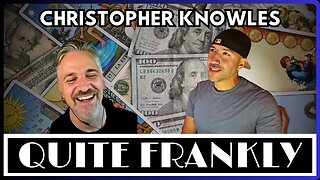 UPCOMING
UPCOMING
Quite Frankly
5 hours agoOccult Pop Culture & The Anne Heche Mystery | Christopher Knowles 9/3/25
1.25K -
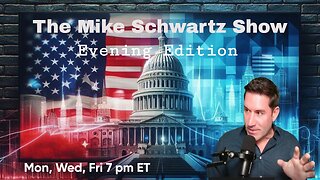 UPCOMING
UPCOMING
The Mike Schwartz Show
2 hours agoTHE MIKE SCHWARTZ SHOW Evening Edition 09-03-2025
782 -
 1:06:42
1:06:42
TheCrucible
2 hours agoThe Extravaganza! EP: 31 (9/03/25
67K1 -
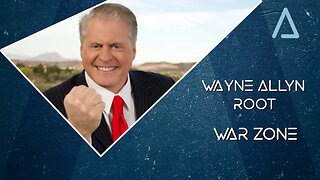 LIVE
LIVE
Wayne Allyn Root | WAR Zone
5 hours agoWAR Zone LIVE | 3 SEPTEMBER 2025
101 watching -
 1:28:57
1:28:57
Redacted News
2 hours agoBREAKING! Putin's DEVASTATING news for Europe | Secret UFO Space Base in Huntsville | Redacted Live
85.8K94 -
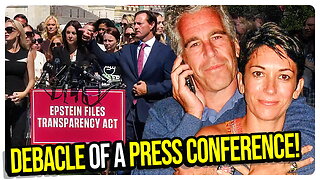 1:17:49
1:17:49
vivafrei
5 hours agoEpstein Press Conference DEBACLE! Missing Minute FOUND? Canada Continues to Fall! & MORE!
85.6K59 -
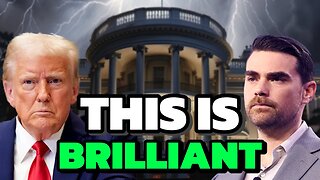 29:30
29:30
Stephen Gardner
2 hours ago🟢YES! Trump’s Doing It! Ben Shapiro UNLEASHES on Democrat STUPIDITY!
34.4K16 -
 LIVE
LIVE
Dr Disrespect
7 hours ago🔴LIVE - DR DISRESPECT - METAL EDEN - NEW 2025 SCI-FI FPS LAUNCH STREAM
936 watching -
 LIVE
LIVE
StoneMountain64
5 hours agoBattlefield's Easter Egg Phantom Project is STILL ALIVE
96 watching